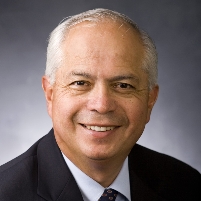Assistant Secretary for Indian Affairs: Who is Larry EchoHawk?
Sunday, May 10, 2009

Larry EchoHawk, President Obama’s choice to head the Bureau of Indian Affairs, was born August 2, 1948, in Cody, Wyoming. A member of the Pawnee Native American tribe of Oklahoma, he is a leading supporter of Native American rights, a Democrat, and a devout Mormon. EchoHawk is one of six children born to a mother with only an eighth grade education. All of her children attended college, four achieved graduate degrees, and three achieved law degrees.
The EchoHawk name was given to Larry EchoHawk’s great-grandfather who was a Pawnee scout in the 1800s. Due to his bravery he was given the name hawk, which represents bravery in Pawnee culture. Echo was added because many other tribe members spoke of his actions and thus his deeds were said to echo through the tribe.
Although born in Cody, Wyoming, Larry EchoHawk grew up in Farmington, New Mexico. At the age of 14 he met Mormon missionaries by the names of Boyd Camphuysen and Lee Pearson and was baptized into the faith. EchoHawk has provided services to the Church of Jesus Christ of Latter-Day Saints in numerous ways over his lifetime. He has held the positions of stake president, bishop, high council member, and board of trustees member for LDS Family Services, a private nonprofit organization owned and operated by the Church of Jesus Christ of Latter-Day Saints that offers drug and family counseling, adoptive services, and whose main goal is counseling women to avoid abortion.
EchoHawk attended Brigham Young University for his undergraduate studies on a football scholarship, where he played the safety position and received his bachelor degree in Physical Education in 1970. He then attended the University of Utah law school, obtaining his JD in 1973. Upon graduation, EchoHawk pursued some postgraduate studies at the Stanford Graduate School of Business.
In 1975 he began practicing law in Salt Lake City, Utah. In 1977 EchoHawk became general legal counsel for the Fort Hall, Idaho-based Shoshone-Bannock Indian tribes. He served in this position, often fighting against states’ jurisdiction over tribes, until 1986.
EchoHawk first entered politics in 1982, winning a seat in the Idaho State House of Representatives from Bannock County. He held this post until 1986, when he was elected Bannock County prosecuting attorney. In 1990 EchoHawk was elected Idaho Attorney General, becoming the first Native American in any state to be elected to a state constitutional elective office. As attorney general he fought for Indian autonomy from state regulation, but also for state freedom from being burdened with any obligations to Indian gaming. EchoHawk took sides on numerous social issues as well. He backed state legislation to exclude gay and lesbian groups from state funding and to restrict classroom discussions, research projects, and library holdings from covering gay or lesbian topics. EchoHawk wrote, “Academic freedom at public universities would be curtailed to ensure public funds were not expended in a manner that could have the 'effect' of 'expressing approval' of homosexuality.'' He also supported a state bill allowing the state to more severely punish pregnant women found to be doing drugs.
While he was state attorney general, EchoHawk also served as national co-chair for Native Americans for Bill Clinton’s 1992 presidential campaign, and was invited with his wife to spend a night in the White House. He was also a principal speaker at the 1992 Democratic National Convention.
In 1994 EchoHawk ran for governor of Idaho when fellow Democrat Cecil B. Andrus retired. He won the primary and led Republican Phil Batt in the throughout most of the general election campaign. Yet EchoHawk ended up losing. Controversy related to his complicated stance on abortion may have had a hand in this. During the campaign, EchoHawk flew to Utah to participate in fundraisers put on by the Mormon Church. Questions arose over his connection to the church and many voters may have been alienated. EchoHawk also was indecisive on the issue of abortion. He is pro-life, yet he vowed not to change Idaho’s existing abortion laws, which allow abortions, and he supported state abortion funding for low-income pregnant women. Pro-lifers felt he was not fighting for their cause, while pro-choicers did not agree with his personal stance. EchoHawk has not run for elected office since then.
Shortly after his defeat in the gubernatorial race, EchoHawk accepted a faculty position at Brigham Young University’s J. Reuben Clark Law School in 1995. He taught courses on criminal law, criminal procedure, and federal Indian law, and published numerous academic papers on Indian land issues, treaty rights, jurisdiction, and justice.
On April 10, 2009, President Obama nominated EchoHawk to become the Assistant Secretary for Indian Affairs within the Department of the Interior.
Larry EchoHawk and his wife Terry, author of a children’s book, Call Me Little Echo Hawk, have six children and many grandchildren.
-Kyle Kuersten
Faculty Profile: Larry EchoHawk (Brigham Young University)
EchoHawk Apologizes to Idaho Tribes for Past Gaming Positions (by Rob Capriccioso, Indian Country Today)
Achieving and Preserving the Promise of America (by Larry EchoHawk, Brigham Young University)
Bureau of Indian Affairs (AllGov)
- Top Stories
- Unusual News
- Where is the Money Going?
- Controversies
- U.S. and the World
- Appointments and Resignations
- Latest News
- Trump to Stop Deportations If…
- Trump Denounces World Series
- What If China Invaded the United States?
- Donald Trump Has a Mental Health Problem and It Has a Name
- Trump Goes on Renaming Frenzy






Comments